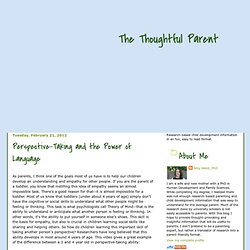

Virtual World Based on Picture Book Characters.
Education Next : Education Next is a journal of opinion and research about education policy. What Works Clearinghouse. Flashcards. Notes on Parenting. The Thoughtful Parent: Perspective-Taking and the Power of Language. As parents, I think one of the goals most of us have is to help our children develop an understanding and empathy for other people.

If you are the parent of a toddler, you know that instilling this idea of empathy seems an almost impossible task. There's a good reason for that--it is almost impossible for a toddler. Most of us know that toddlers (under about 4 years of age) simply don't have the cognitive or social skills to understand what other people might be feeling or thinking. This task is what psychologists call Theory of Mind--that is the ability to understand or anticipate what another person is feeling or thinking. In other words, it's the ability to put yourself in someone else's shoes. After viewing this video, it's almost as if something magical happens between age 3 and 4 that helps kids learn this skill. Farrant BM, Maybery MT, & Fletcher J (2012). Teach Baby to Sign. The Case Against Flash Cards — Maria Montessori. © MariaMontessori.com As the director of a Montessori school, one of the most frequent questions I get from parents is, “What should I be doing at home to help my child academically?”

My answer is always the same: “Talk and read with your child.” Of course, this never satisfies parents because this seems too simple, and parents – who want to ensure they’re doing right by their child — feel as if they should be doing something more. But it’s often the simple solution that is most effective (and backed by research!). One of my favorite longitudinal studies was conducted by a Standford linguistic anthropologist, Shirley Brice Heath (1982). Heath found that the Maintown children had a greater advantage academically because of how their parents spoke with them. The Roadville parents, on the other hand, insisted the children read books from beginning to end, with no skipping ahead. Roadville Parents did ask rehearsal questions but far fewer than Maintown parents.
Method of Learning a Foreign Language. “Probably no aspect of learning a foreign language is more important than memory.

Yet no aspect of language learning has been less well examined.” Dr. Paul Pimsleur The Pimsleur® Method is the foundation upon which every Pimsleur course is built. It’s a scientifically proven set of principles designed to take a learner directly to the heart of the language, eliminating noise, confusion, and information overload. People all over the world are using Pimsleur programs to start speaking and understanding new languages quickly and easily.
Graduated Interval Recall Dr. Principle of Anticipation Our brains are hard-wired to automatically process speech and “anticipate” a correct response. Core Vocabulary Effective communication in any language depends on mastery of a relatively limited number of words and structures. Organic Learning Every new item introduced in a Pimsleur course is given within the context of a conversation or exchange. Paul Pimsleur (1928-1976) Dr. SURPRISING TRUTHS: THE IMPLICATIONS OF BRAIN RESEARCH. Teaching English in Japan / English Teaching in Japan / Jobs in Japan.